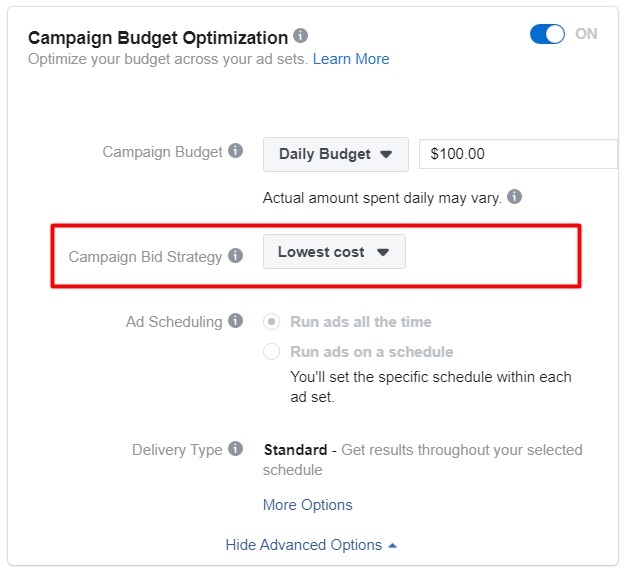Have you realized that Facebook ads are a great opportunity to grow your business but you’re counting every penny you spend on marketing? Well, you’re not the only one.
Businesses spend more than ever on advertising with Facebook and its family of services. According to Statista, companies spent nearly $9.9 billion dollars globally on Facebook ads in 2019. That’s almost $2 billion more than in 2018.
Good budgeting is one of the pillars of successful advertising on Facebook. The first question you should ask yourself to understand how your budget will affect your ad performance is What is bidding on Facebook ads?
Let’s give an answer.
What is Ad Bidding on Facebook?
Facebook bidding is an auction-based ad delivery system designed to find the best ad to show to a certain user at a certain moment.
Billions of ad auctions are launched by millions of advertisers every day. Multiple businesses can simultaneously compete for the attention of people from the same target audience. How does Facebook determine the winner?
There are three major components that affect Facebook ad delivery:
- Bid and bid strategy — The amount of money you pay for your ads and the bid type you choose
- Estimated action rates — The likelihood of achieving a marketing objective with targeted ads
- Ad quality — Measured by factors that tell whether your target audience values your ads (For example, Facebook measures the number of times people like or hide your ad.)
In a Facebook ad auction, a bid is the amount of money you’re ready to pay to reach your target audience and accomplish your marketing objective.
Note that the size of the bid in an ad auction doesn’t play the decisive role.
To win an auction, your ad has to be relevant to people who see it. The Facebook ad delivery system is built so that more relevant ads often cost less than ads with higher bids.
Major Facebook Ad Bidding Strategies
To participate in an ad auction, you have to choose your Facebook bid strategy (the Campaign Bid Strategy in the Campaign Budget Optimization interface).

Here are the options available:
Lowest Cost
Lowest cost is a bid strategy that allows you to delegate Facebook bid control fully to the platform. We recommend using it when you’re ready to spend your entire budget on the opportunities that cost the least. However, note that costs may go up because you may run down these opportunities or increase your budget.
Supported marketing objectives:
- Brand Awareness
- Reach
- Traffic
- Engagement (Post Engagement, Page Likes, Event Response)
- App Installs
- Video Views
- Lead Generation
- Messages (excludes Sponsored Messages)
- Conversions
- Product Catalogue Sales
Bid Cap
Setting a Facebook bid cap is a good way to win in a competition with Facebook advertisers who target the same audiences as you. By setting a maximum bid in an auction, you can keep the cost of your ads under control and show ads to as many people as possible at your bid price.
Supported marketing objectives:
- Brand Awareness
- Reach
- Traffic
- Engagement (Post Engagement, Page Likes, Event Response)
- App Installs
- Video Views
- Lead Generation
- Messages (excludes Sponsored Messages)
- Conversions
- Product Catalogue Sales
Cost Cap
A cost cap allows you to moderate the cost of your ads by keeping it within limits and achieve a great conversion boost with a reasonable cost per acquisition (CPA) or cost per install (CPI). If you choose this bidding strategy, you don’t have to adjust your bids manually to minimize ad spending.
Supported marketing objectives:
- Traffic
- App Installs
- Event Responses
- Lead Generation
- Offsite Conversions and Catalogue Sales with the following ad delivery optimizations: Landing Page View, Link Clicks, Page Likes, Post Engagement, Replies, Video Views, Product Catalogue Sales W/ Link Click, Offsite Conversions
Target Cost
Advertisers use the target cost bidding strategy to make the most of conversions by restraining ad costs. In other words, if you use this option, you’ll be able to know exactly how much you’re going to pay for your ads. However, note that you’re more likely to lose your money in cheaper auctions.
Supported marketing objectives:
- Traffic
- App Installs (Installs, App Events, Video Views)
- Lead Generation
- Conversions
- Product Catalogue Sales
Value Optimization with Minimum Return on Ad Spend
Obviously, Facebook recommends this bidding strategy to marketers who want to optimize their return on ad spend (ROAS). If you’re one of these marketers, keep in mind that if you set a really high benchmark, it may negatively affect your ad delivery.
Supported marketing objectives:
- App Installs
- Conversions
- Catalogue Sales
Highest Value
When using the highest value bidding strategy, you let Facebook spend the full budget to reach a maximum return on ad spend.
Supported marketing objectives:
- App Installs
- Conversions
- Catalogue Sales
Major Ad Bidding Types on Facebook
Depending on your bid strategy, Facebook will offer you one of the following bidding types:
Cost per Click (CPC)
Pay for your ads only when users click on them. In other words, Facebook will display your ad free of charge until someone clicks on it.
Cost per 1,000 Impressions (CPM)
Also called cost per mille, this type of bidding allows you to set the amount you’re ready to pay for 1,000 impressions.
CPM bidding on Facebook is a great choice for businesses with a vast customer base. Large reach is the only factor that guarantees success using this method. If you’re a small business, you may lose a lot of money without getting positive results.
There’s also oCPM bidding on Facebook, or optimized cost per 1,000 impressions. This bidding type is used to show ads to people who are more likely to take an action after viewing them.
Cost per Acquisition (CPA)
Also called cost per action, cost per acquisition was used for bids targeted at people who were more likely to make conversions after seeing your ads.
However, Facebook CPA bidding is no longer available. If you try to add CPA as a metric in Ads Manager to see the outcomes of your ad campaigns, you won’t find it there anymore. To track the effectiveness of conversion bids, you need to install a Facebook Pixel.
How to Make Bids That Win an Ad Auction on Facebook
Launching an ad campaign in Facebook Ads Manager is intuitive. Before you set your budget and schedule your ads, you need to choose three things that determine your bidding:
- Marketing objective
- Target audience
- Ad placements
After that, you’re free to get started with optimizing your ad spending. Here are some tips and tricks to help your business bid wisely.
Monitor Ad Relevance Diagnostics
More relevant ads cost less. Previously called the relevance score, ad relevance diagnostics is a Facebook ad metric that shows how relevant your ads are to your target audience.
Keep in mind that ad relevance diagnostics isn’t a means to an end. It doesn’t improve the performance of your ads; it just shows whether you need to improve your ads.
Start Automatically, Continue Manually
You may want to know the difference between manual bidding vs automatic bidding on Facebook.
When it comes to Facebook ads, a manual bidding strategy is recommended for advertisers who already have experience launching ad campaigns and fully understand how Facebook can help them achieve their marketing goals.
At the beginning, let Facebook set your bids for you. After you receive the first results, you’ll be able to see whether you need to optimize your bids for future campaigns.
Dare to Bid Higher
Even though the bid amount isn’t the decisive factor, it still matters a lot.
When you bid higher, you have more chances of leaving your competitors behind. Not to mention that higher bids allow you to show your ads to more people.
The coolest part is that Facebook doesn’t seize the entire bid amount you set for your ad campaign but rather the minimum amount necessary for winning an ad auction.
For example, if your rival’s bid is $0.70, you’ll pay $0.71.
Bid for Facebook Video Ads
Thank you for reading our express guide. Have fun, enjoy the experience, and get spectacular results with your bidding!
To make your journey even more cheerful and less challenging, you can try the Softcube artificial intelligence system to make video ads at scale.
Bid with optimism and promote your products or services automatically. Good luck!

![featured image thumbnail for post The Rookie’s Guide to Creative Facebook Ads [30 Examples]](/static/596e56a60d16703bc60c5005333383ae/188f6/creative-facebook-ads-featured-image.jpg)
